
FedML
FEDML - The unified and scalable ML library for large-scale distributed training, model serving, and federated learning. FEDML Launch, a cross-cloud scheduler, further enables running any AI jobs on any GPU cloud or on-premise cluster. Built on this library, TensorOpera AI (https://TensorOpera.ai) is your generative AI platform at scale.
Stars: 3761
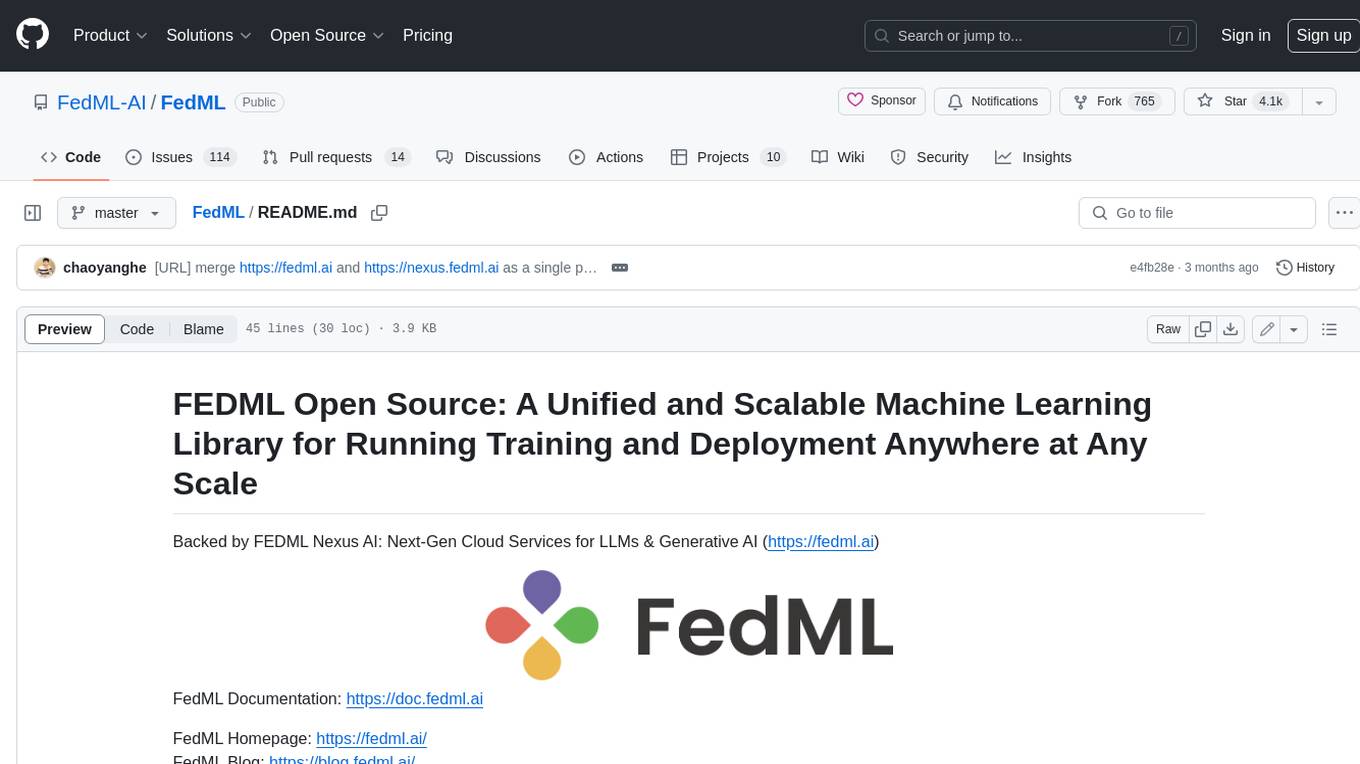
FedML is a unified and scalable machine learning library for running training and deployment anywhere at any scale. It is highly integrated with FEDML Nexus AI, a next-gen cloud service for LLMs & Generative AI. FEDML Nexus AI provides holistic support of three interconnected AI infrastructure layers: user-friendly MLOps, a well-managed scheduler, and high-performance ML libraries for running any AI jobs across GPU Clouds.
README:
FEDML Open Source: A Unified and Scalable Machine Learning Library for Running Training and Deployment Anywhere at Any Scale
Backed by TensorOpera AI: Your Generative AI Platform at Scale (https://TensorOpera.ai)
TensorOpera Documentation: https://docs.TensorOpera.ai
TensorOpera Homepage: https://TensorOpera.ai/
TensorOpera Blog: https://blog.TensorOpera.ai/
Join the Community:
Slack: https://join.slack.com/t/fedml/shared_invite/zt-havwx1ee-a1xfOUrATNfc9DFqU~r34w
Discord: https://discord.gg/9xkW8ae6RV
TensorOpera® AI (https://TensorOpera.ai) is the next-gen cloud service for LLMs & Generative AI. It helps developers to launch complex model training, deployment, and federated learning anywhere on decentralized GPUs, multi-clouds, edge servers, and smartphones, easily, economically, and securely.
Highly integrated with TensorOpera open source library, TensorOpera AI provides holistic support of three interconnected AI infrastructure layers: user-friendly MLOps, a well-managed scheduler, and high-performance ML libraries for running any AI jobs across GPU Clouds.
A typical workflow is showing in figure above. When developer wants to run a pre-built job in Studio or Job Store, TensorOpera®Launch swiftly pairs AI jobs with the most economical GPU resources, auto-provisions, and effortlessly runs the job, eliminating complex environment setup and management. When running the job, TensorOpera®Launch orchestrates the compute plane in different cluster topologies and configuration so that any complex AI jobs are enabled, regardless model training, deployment, or even federated learning. TensorOpera®Open Source is unified and scalable machine learning library for running these AI jobs anywhere at any scale.
In the MLOps layer of TensorOpera AI
- TensorOpera® Studio embraces the power of Generative AI! Access popular open-source foundational models (e.g., LLMs), fine-tune them seamlessly with your specific data, and deploy them scalably and cost-effectively using the TensorOpera Launch on GPU marketplace.
- TensorOpera® Job Store maintains a list of pre-built jobs for training, deployment, and federated learning. Developers are encouraged to run directly with customize datasets or models on cheaper GPUs.
In the scheduler layer of TensorOpera AI
- TensorOpera® Launch swiftly pairs AI jobs with the most economical GPU resources, auto-provisions, and effortlessly runs the job, eliminating complex environment setup and management. It supports a range of compute-intensive jobs for generative AI and LLMs, such as large-scale training, serverless deployments, and vector DB searches. TensorOpera Launch also facilitates on-prem cluster management and deployment on private or hybrid clouds.
In the Compute layer of TensorOpera AI
- TensorOpera® Deploy is a model serving platform for high scalability and low latency.
- TensorOpera® Train focuses on distributed training of large and foundational models.
- TensorOpera® Federate is a federated learning platform backed by the most popular federated learning open-source library and the world’s first FLOps (federated learning Ops), offering on-device training on smartphones and cross-cloud GPU servers.
- TensorOpera® Open Source is unified and scalable machine learning library for running these AI jobs anywhere at any scale.
FedML embraces and thrive through open-source. We welcome all kinds of contributions from the community. Kudos to all of our amazing contributors!
FedML has adopted Contributor Covenant.
For Tasks:
Click tags to check more tools for each tasksFor Jobs:
Alternative AI tools for FedML
Similar Open Source Tools

FedML
FedML is a unified and scalable machine learning library for running training and deployment anywhere at any scale. It is highly integrated with FEDML Nexus AI, a next-gen cloud service for LLMs & Generative AI. FEDML Nexus AI provides holistic support of three interconnected AI infrastructure layers: user-friendly MLOps, a well-managed scheduler, and high-performance ML libraries for running any AI jobs across GPU Clouds.
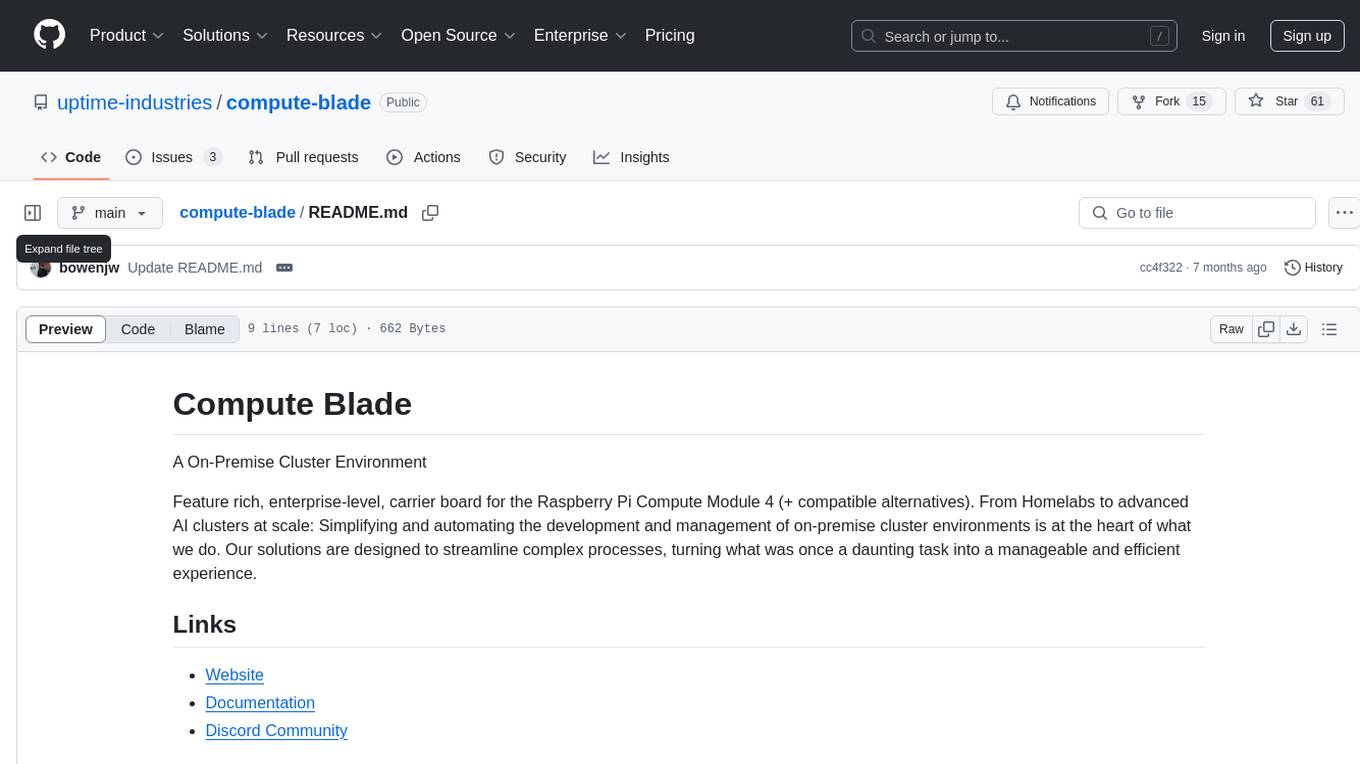
compute-blade
Compute Blade is a feature-rich carrier board designed for the Raspberry Pi Compute Module 4 and compatible alternatives, aimed at simplifying and automating the development and management of on-premise cluster environments. The solution streamlines complex processes, making cluster setup and management efficient and manageable for users, from homelabs to advanced AI clusters at scale.
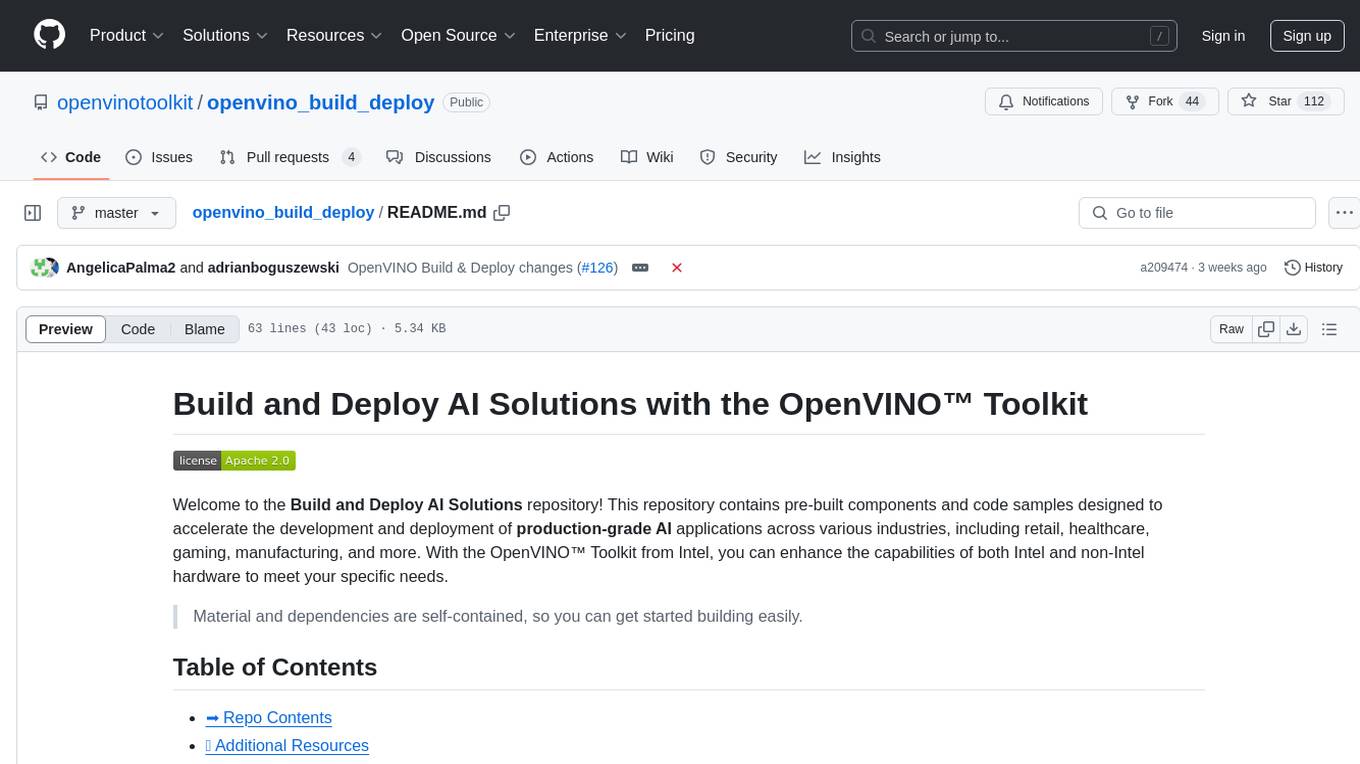
openvino_build_deploy
The OpenVINO Build and Deploy repository provides pre-built components and code samples to accelerate the development and deployment of production-grade AI applications across various industries. With the OpenVINO Toolkit from Intel, users can enhance the capabilities of both Intel and non-Intel hardware to meet specific needs. The repository includes AI reference kits, interactive demos, workshops, and step-by-step instructions for building AI applications. Additional resources such as Jupyter notebooks and a Medium blog are also available. The repository is maintained by the AI Evangelist team at Intel, who provide guidance on real-world use cases for the OpenVINO toolkit.
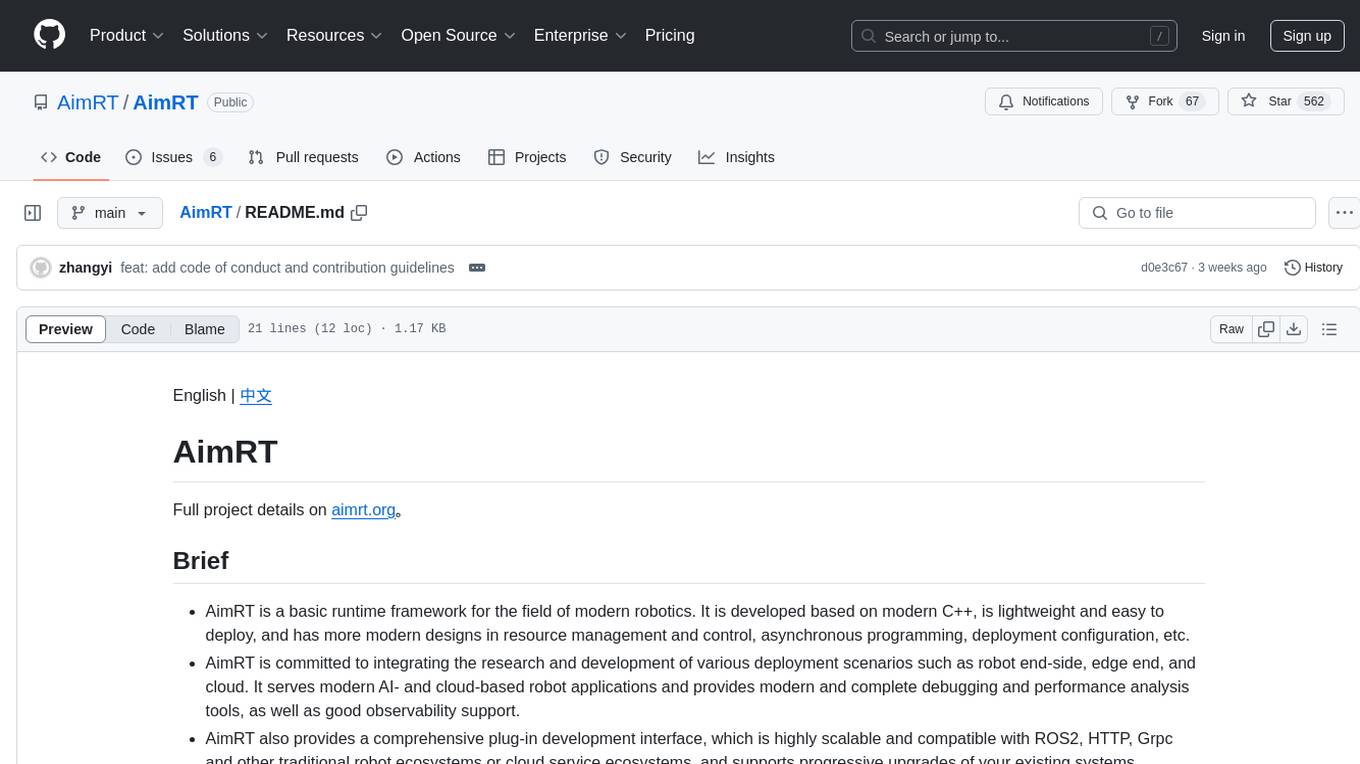
AimRT
AimRT is a basic runtime framework for modern robotics, developed in modern C++ with lightweight and easy deployment. It integrates research and development for robot applications in various deployment scenarios, providing debugging tools and observability support. AimRT offers a plug-in development interface compatible with ROS2, HTTP, Grpc, and other ecosystems for progressive system upgrades.
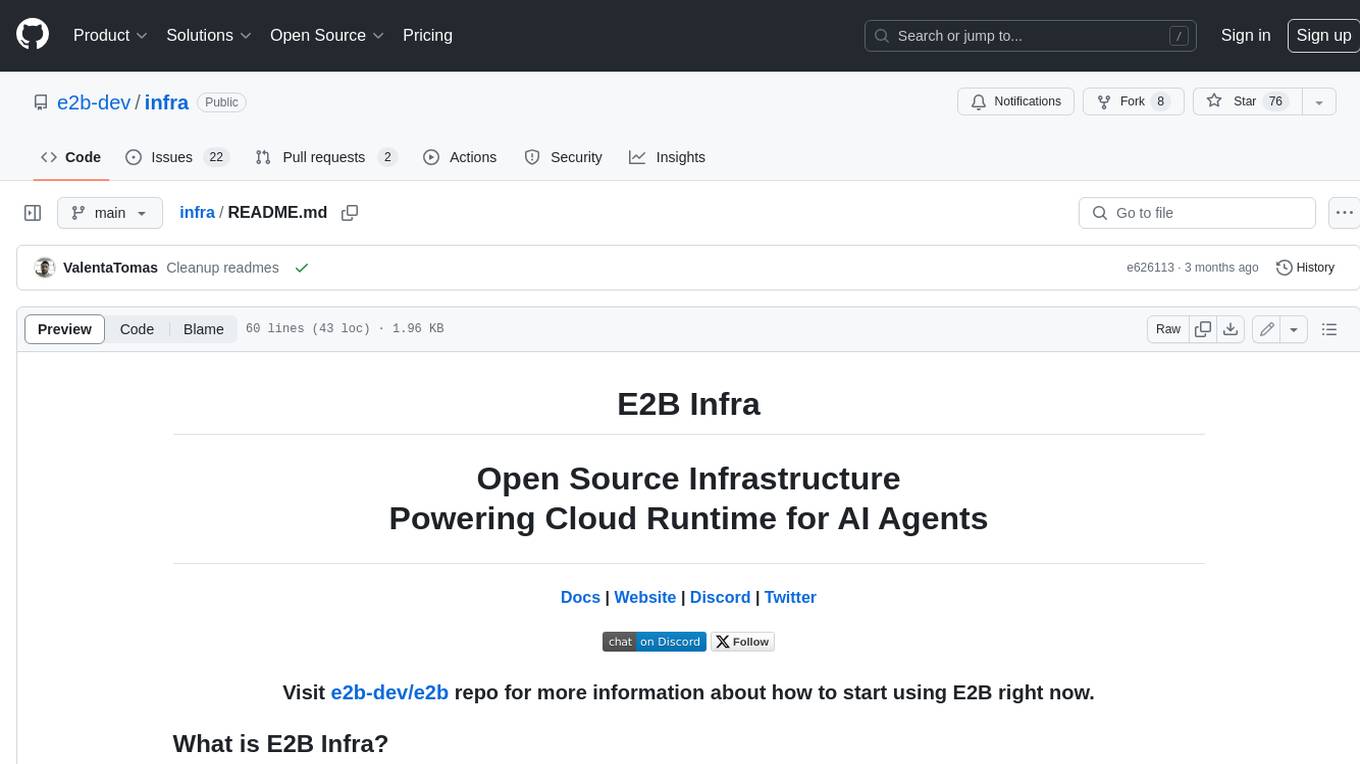
infra
E2B Infra is a cloud runtime for AI agents. It provides SDKs and CLI to customize and manage environments and run AI agents in the cloud. The infrastructure is deployed using Terraform and is currently only deployable on GCP. The main components of the infrastructure are the API server, daemon running inside instances (sandboxes), Nomad driver for managing instances (sandboxes), and Nomad driver for building environments (templates).

qdrant
Qdrant is a vector similarity search engine and vector database. It is written in Rust, which makes it fast and reliable even under high load. Qdrant can be used for a variety of applications, including: * Semantic search * Image search * Product recommendations * Chatbots * Anomaly detection Qdrant offers a variety of features, including: * Payload storage and filtering * Hybrid search with sparse vectors * Vector quantization and on-disk storage * Distributed deployment * Highlighted features such as query planning, payload indexes, SIMD hardware acceleration, async I/O, and write-ahead logging Qdrant is available as a fully managed cloud service or as an open-source software that can be deployed on-premises.
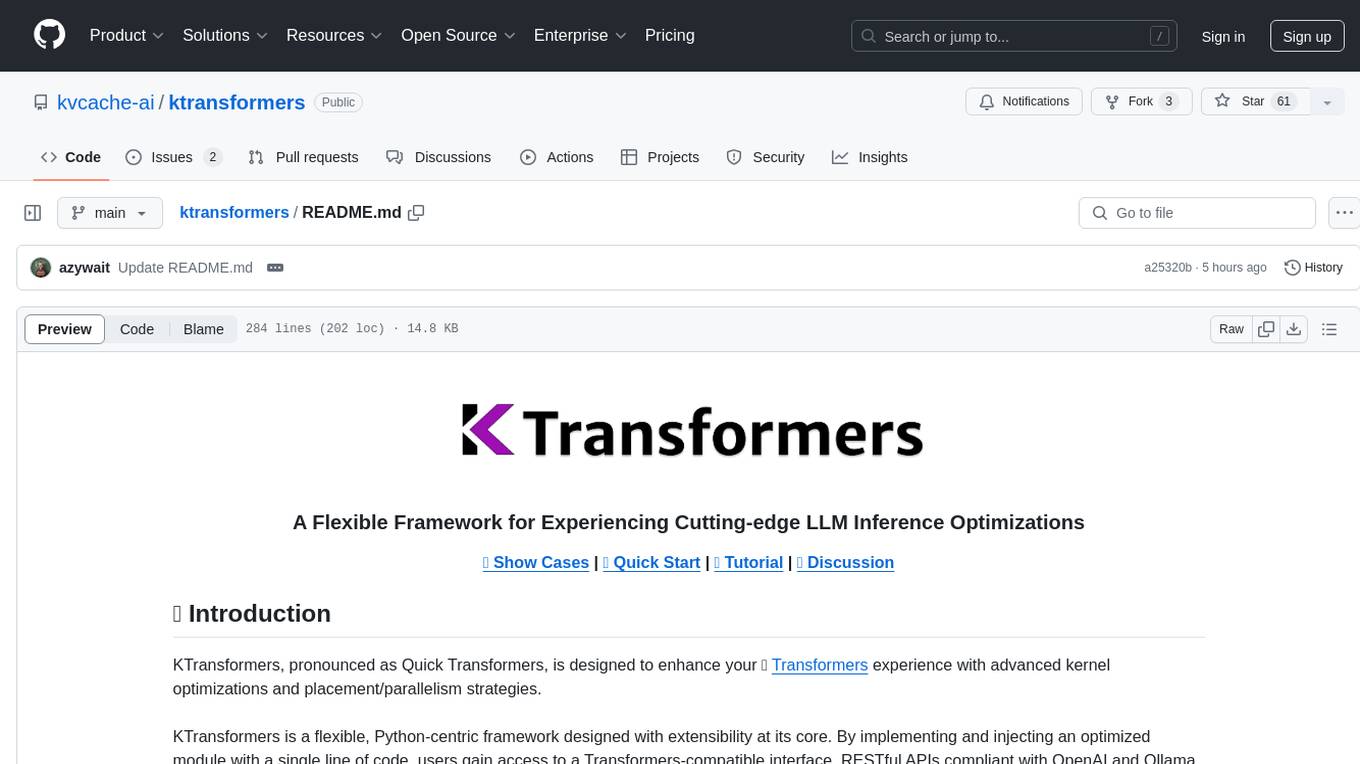
ktransformers
KTransformers is a flexible Python-centric framework designed to enhance the user's experience with advanced kernel optimizations and placement/parallelism strategies for Transformers. It provides a Transformers-compatible interface, RESTful APIs compliant with OpenAI and Ollama, and a simplified ChatGPT-like web UI. The framework aims to serve as a platform for experimenting with innovative LLM inference optimizations, focusing on local deployments constrained by limited resources and supporting heterogeneous computing opportunities like GPU/CPU offloading of quantized models.
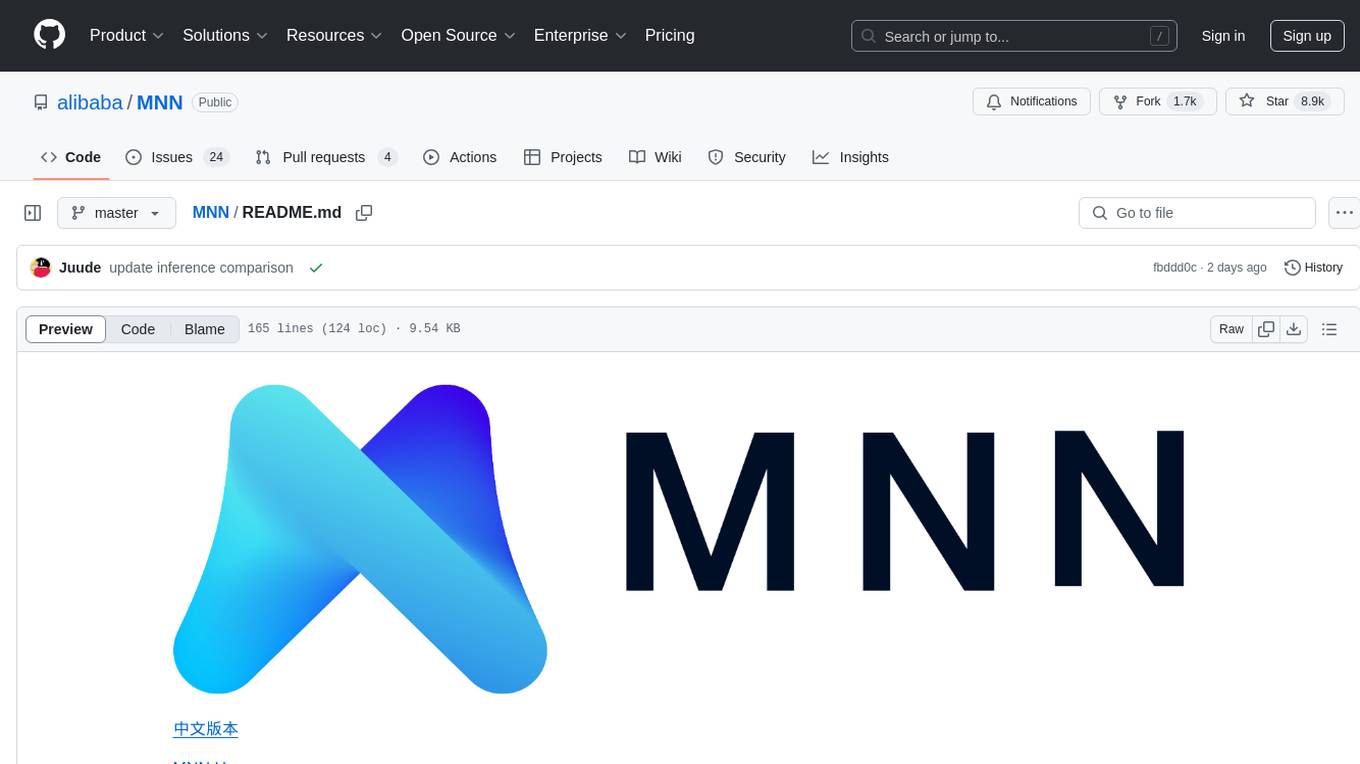
MNN
MNN is a highly efficient and lightweight deep learning framework that supports inference and training of deep learning models. It has industry-leading performance for on-device inference and training. MNN has been integrated into various Alibaba Inc. apps and is used in scenarios like live broadcast, short video capture, search recommendation, and product searching by image. It is also utilized on embedded devices such as IoT. MNN-LLM and MNN-Diffusion are specific runtime solutions developed based on the MNN engine for deploying language models and diffusion models locally on different platforms. The framework is optimized for devices, supports various neural networks, and offers high performance with optimized assembly code and GPU support. MNN is versatile, easy to use, and supports hybrid computing on multiple devices.
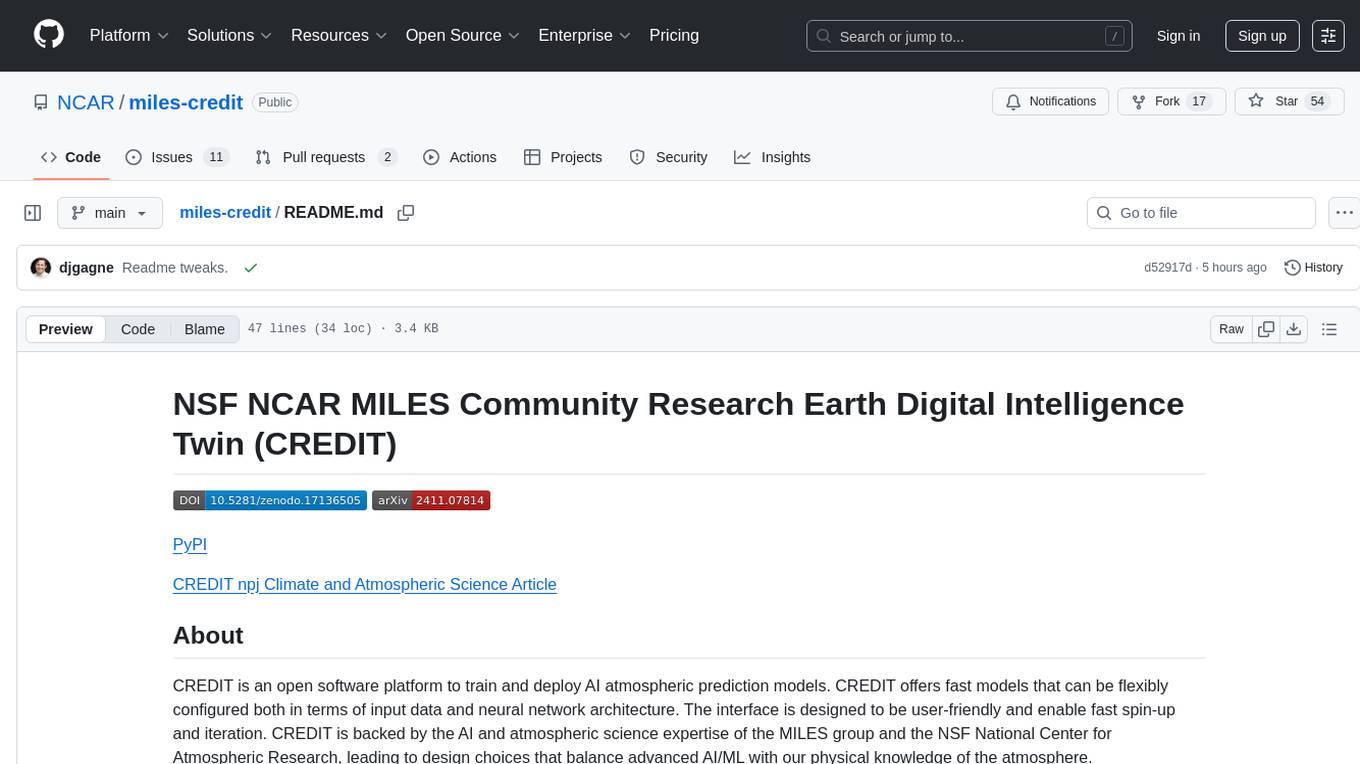
miles-credit
CREDIT is an open software platform for training and deploying AI atmospheric prediction models. It offers fast models with flexible configuration options for input data and neural network architecture. The user-friendly interface enables quick setup and iteration. Developed by the MILES group and NSF National Center for Atmospheric Research, CREDIT combines advanced AI/ML with atmospheric science expertise. It provides a stable release with various models, training, and deployment options, with ongoing development. Detailed documentation is available for installation, training, deployment, config file interpretation, and API usage.
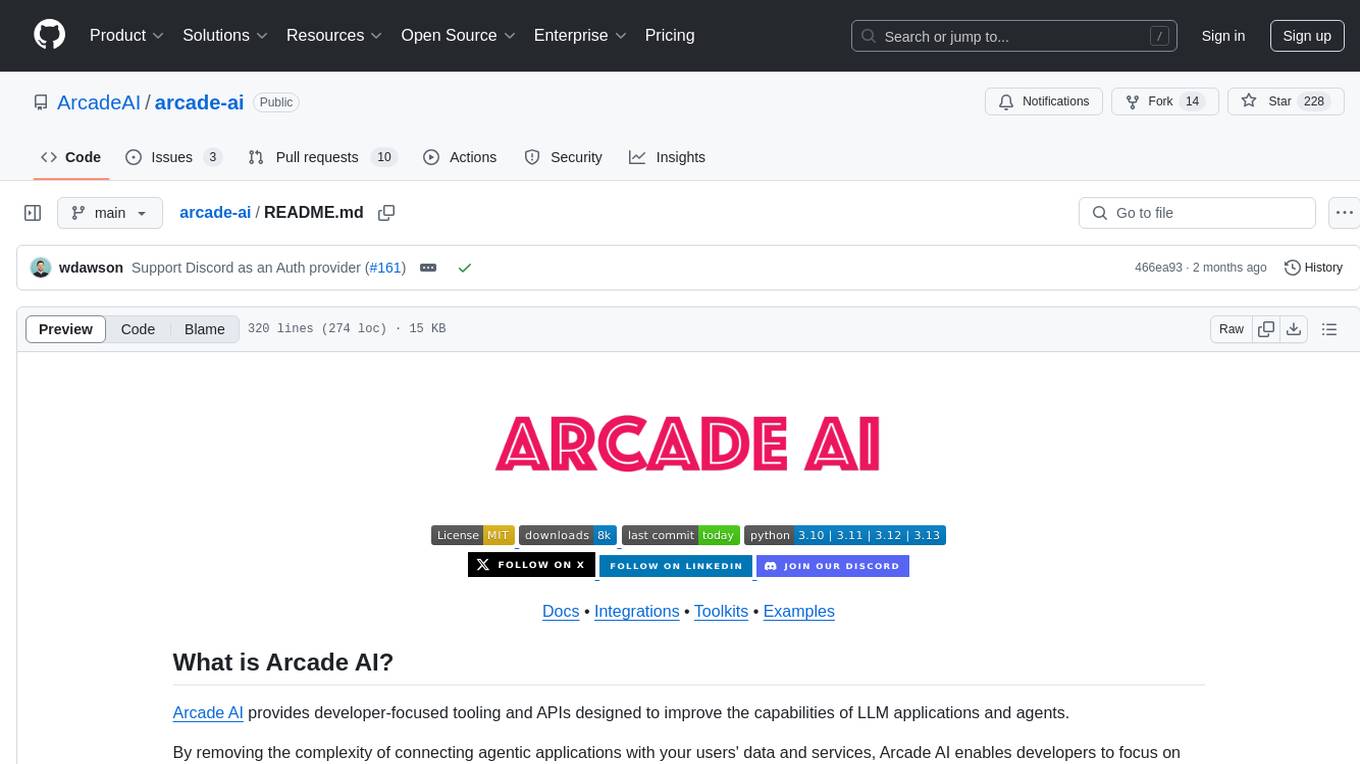
arcade-ai
Arcade AI is a developer-focused tooling and API platform designed to enhance the capabilities of LLM applications and agents. It simplifies the process of connecting agentic applications with user data and services, allowing developers to concentrate on building their applications. The platform offers prebuilt toolkits for interacting with various services, supports multiple authentication providers, and provides access to different language models. Users can also create custom toolkits and evaluate their tools using Arcade AI. Contributions are welcome, and self-hosting is possible with the provided documentation.
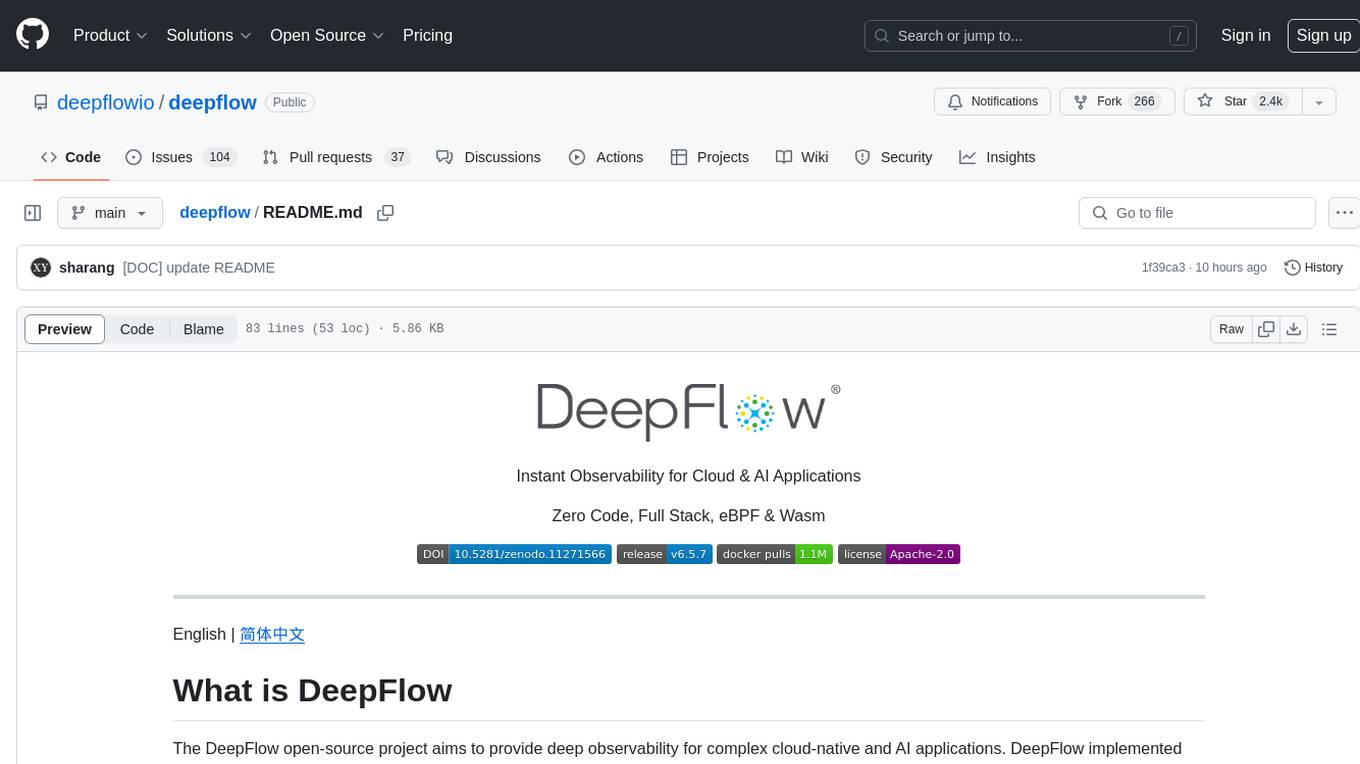
deepflow
DeepFlow is an open-source project that provides deep observability for complex cloud-native and AI applications. It offers Zero Code data collection with eBPF for metrics, distributed tracing, request logs, and function profiling. DeepFlow is integrated with SmartEncoding to achieve Full Stack correlation and efficient access to all observability data. With DeepFlow, cloud-native and AI applications automatically gain deep observability, removing the burden of developers continually instrumenting code and providing monitoring and diagnostic capabilities covering everything from code to infrastructure for DevOps/SRE teams.
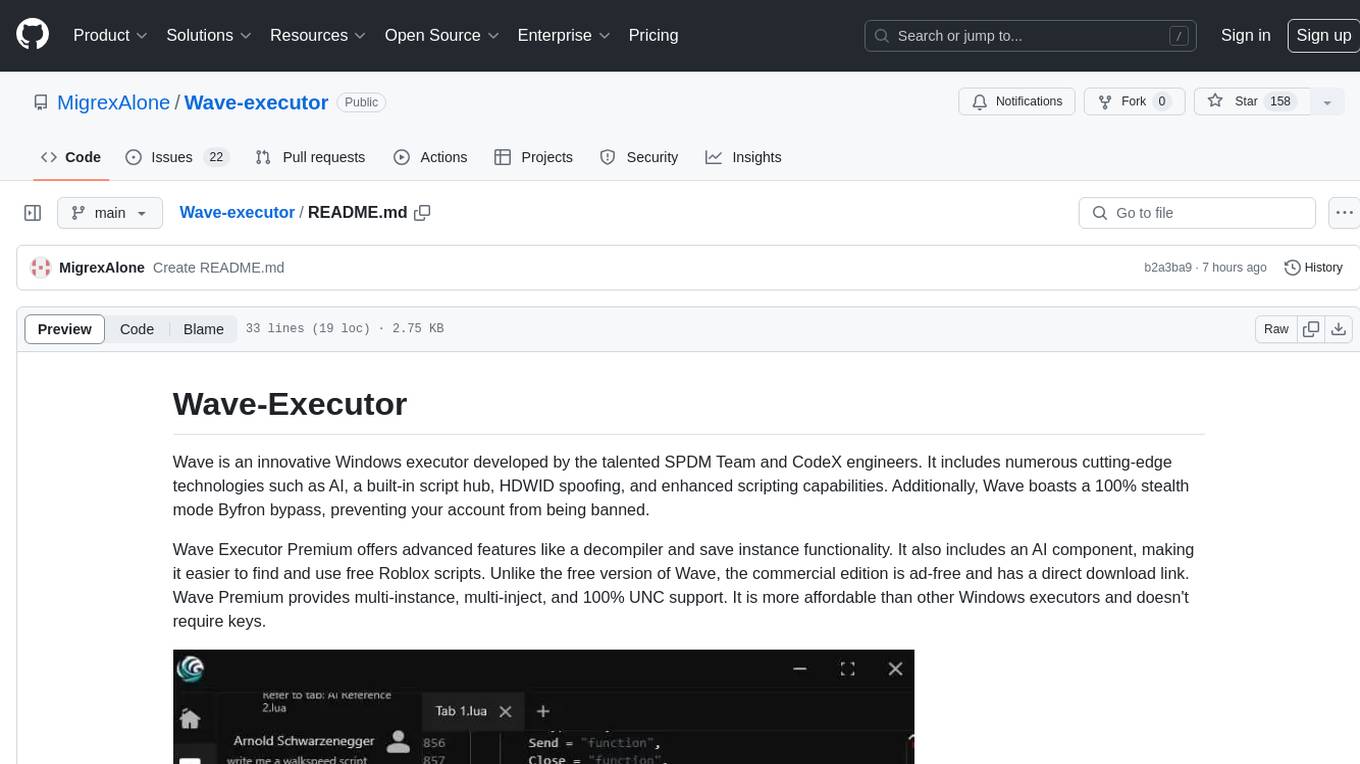
Wave-executor
Wave Executor is an innovative Windows executor developed by SPDM Team and CodeX engineers, featuring cutting-edge technologies like AI, built-in script hub, HDWID spoofing, and enhanced scripting capabilities. It offers a 100% stealth mode Byfron bypass, advanced features like decompiler and save instance functionality, and a commercial edition with ad-free experience and direct download link. Wave Premium provides multi-instance, multi-inject, and 100% UNC support, making it a cost-effective option for executing scripts in popular Roblox games.
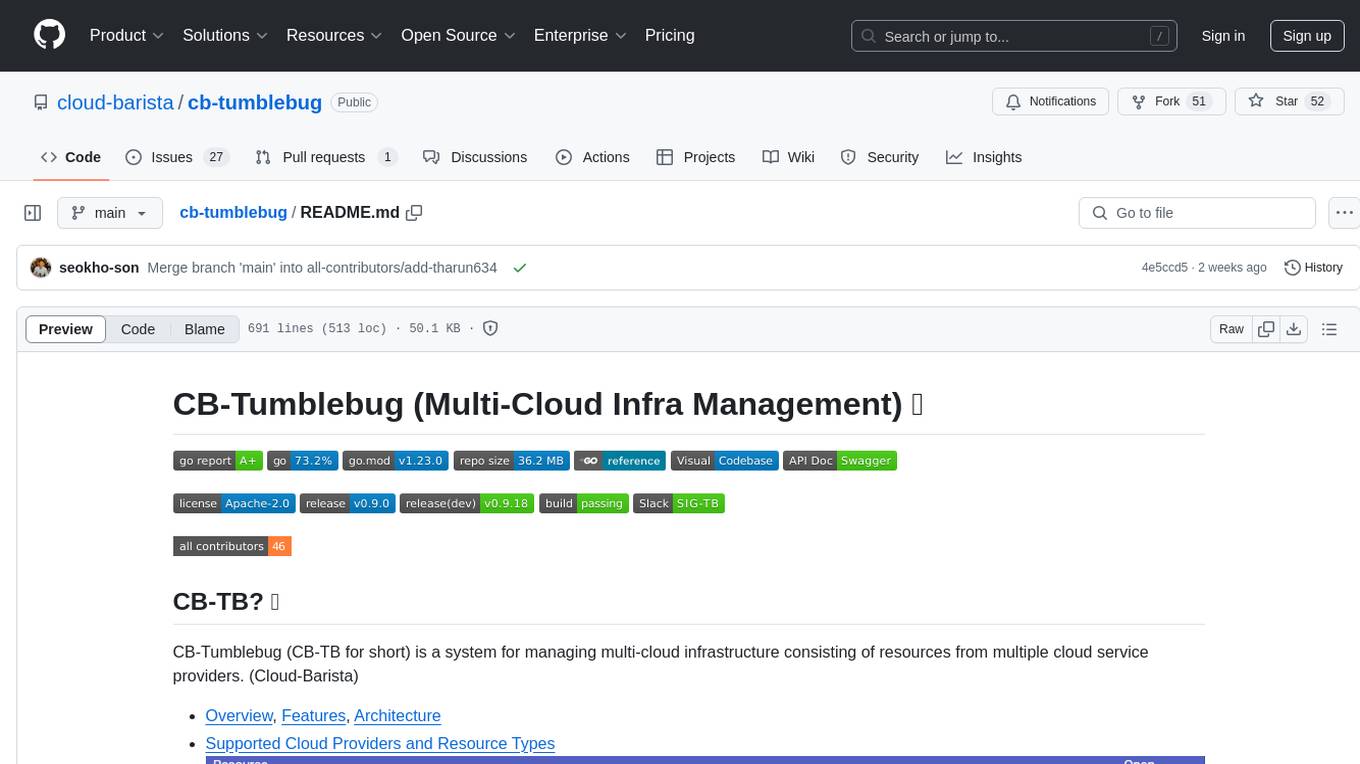
cb-tumblebug
CB-Tumblebug (CB-TB) is a system for managing multi-cloud infrastructure consisting of resources from multiple cloud service providers. It provides an overview, features, and architecture. The tool supports various cloud providers and resource types, with ongoing development and localization efforts. Users can deploy a multi-cloud infra with GPUs, enjoy multiple LLMs in parallel, and utilize LLM-related scripts. The tool requires Linux, Docker, Docker Compose, and Golang for building the source. Users can run CB-TB with Docker Compose or from the Makefile, set up prerequisites, contribute to the project, and view a list of contributors. The tool is licensed under an open-source license.
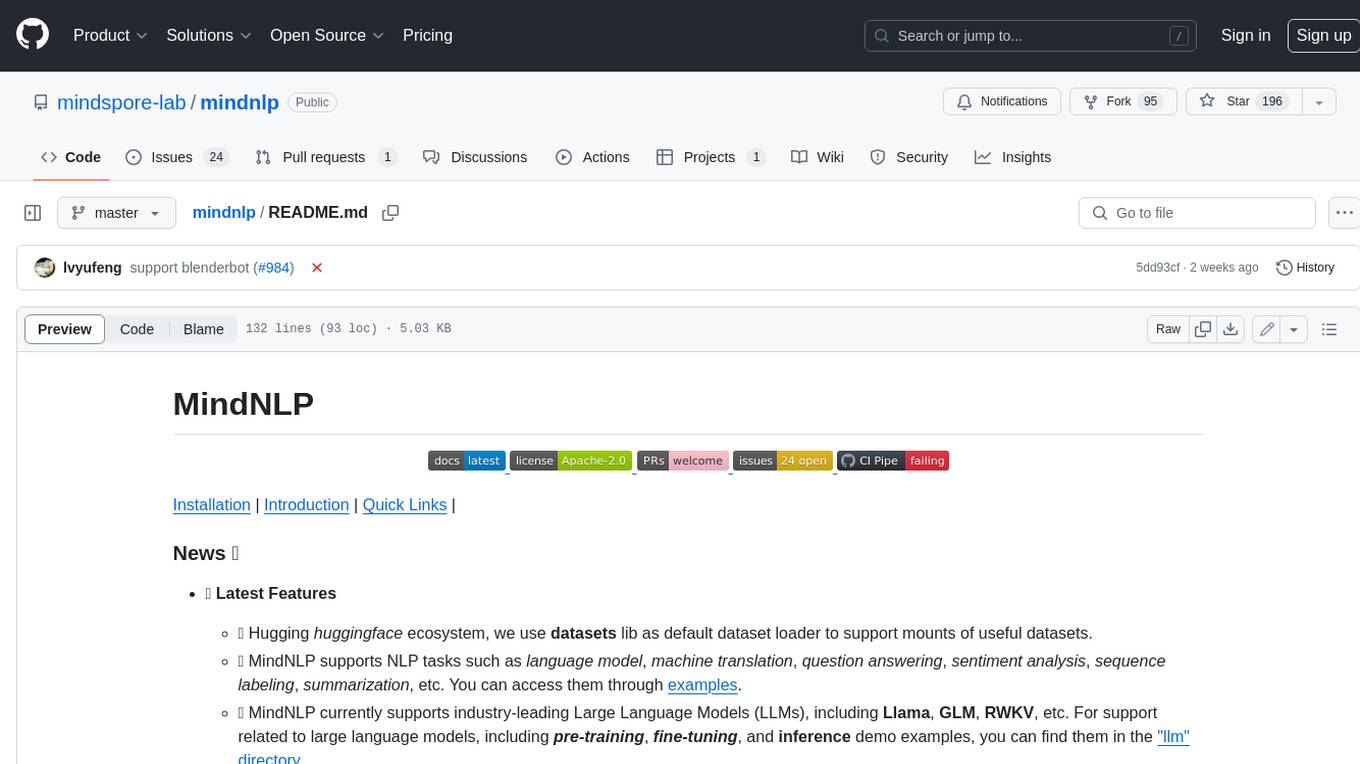
mindnlp
MindNLP is an open-source NLP library based on MindSpore. It provides a platform for solving natural language processing tasks, containing many common approaches in NLP. It can help researchers and developers to construct and train models more conveniently and rapidly. Key features of MindNLP include: * Comprehensive data processing: Several classical NLP datasets are packaged into a friendly module for easy use, such as Multi30k, SQuAD, CoNLL, etc. * Friendly NLP model toolset: MindNLP provides various configurable components. It is friendly to customize models using MindNLP. * Easy-to-use engine: MindNLP simplified complicated training process in MindSpore. It supports Trainer and Evaluator interfaces to train and evaluate models easily. MindNLP supports a wide range of NLP tasks, including: * Language modeling * Machine translation * Question answering * Sentiment analysis * Sequence labeling * Summarization MindNLP also supports industry-leading Large Language Models (LLMs), including Llama, GLM, RWKV, etc. For support related to large language models, including pre-training, fine-tuning, and inference demo examples, you can find them in the "llm" directory. To install MindNLP, you can either install it from Pypi, download the daily build wheel, or install it from source. The installation instructions are provided in the documentation. MindNLP is released under the Apache 2.0 license. If you find this project useful in your research, please consider citing the following paper: @misc{mindnlp2022, title={{MindNLP}: a MindSpore NLP library}, author={MindNLP Contributors}, howpublished = {\url{https://github.com/mindlab-ai/mindnlp}}, year={2022} }
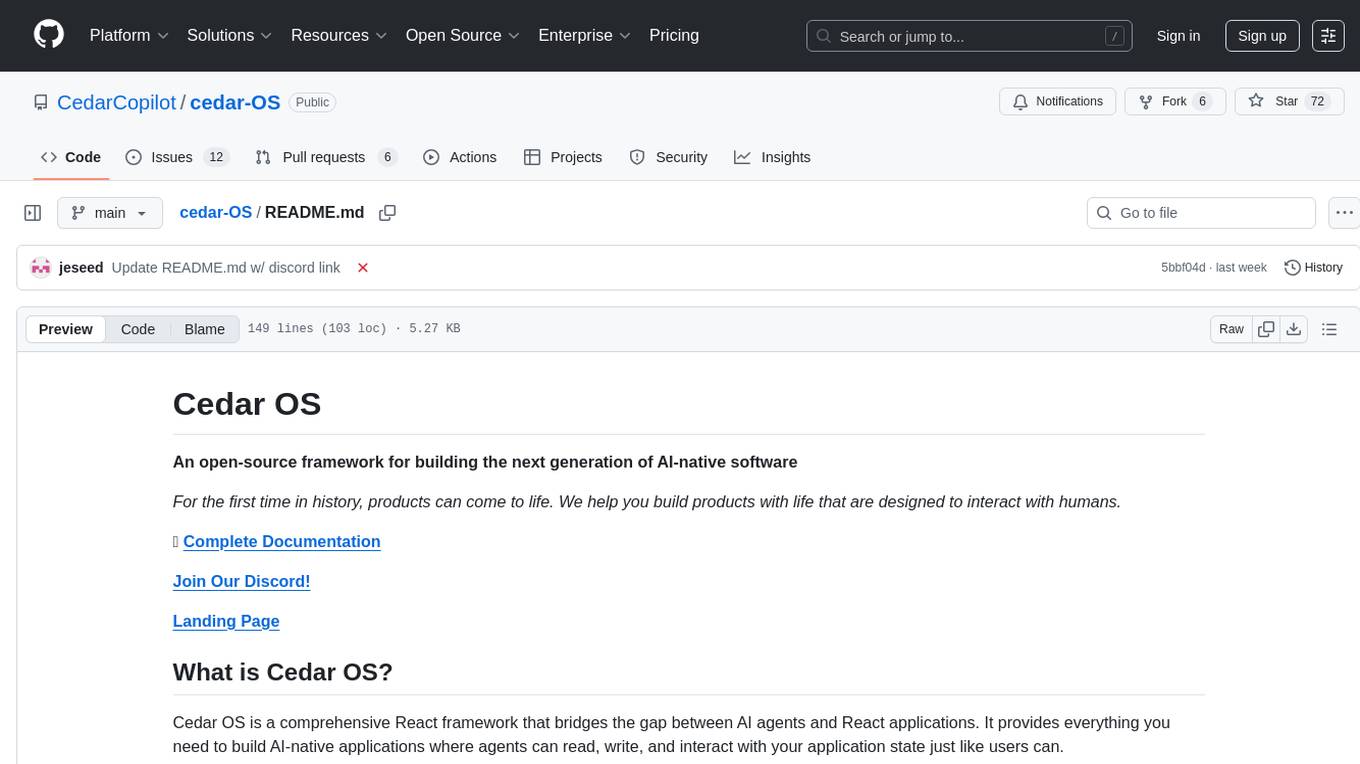
cedar-OS
Cedar OS is an open-source framework that bridges the gap between AI agents and React applications, enabling the creation of AI-native applications where agents can interact with the application state like users. It focuses on providing intuitive and powerful ways for humans to interact with AI through features like full state integration, real-time streaming, voice-first design, and flexible architecture. Cedar OS offers production-ready chat components, agentic state management, context-aware mentions, voice integration, spells & quick actions, and fully customizable UI. It differentiates itself by offering a true AI-native architecture, developer-first experience, production-ready features, and extensibility. Built with TypeScript support, Cedar OS is designed for developers working on ambitious AI-native applications.
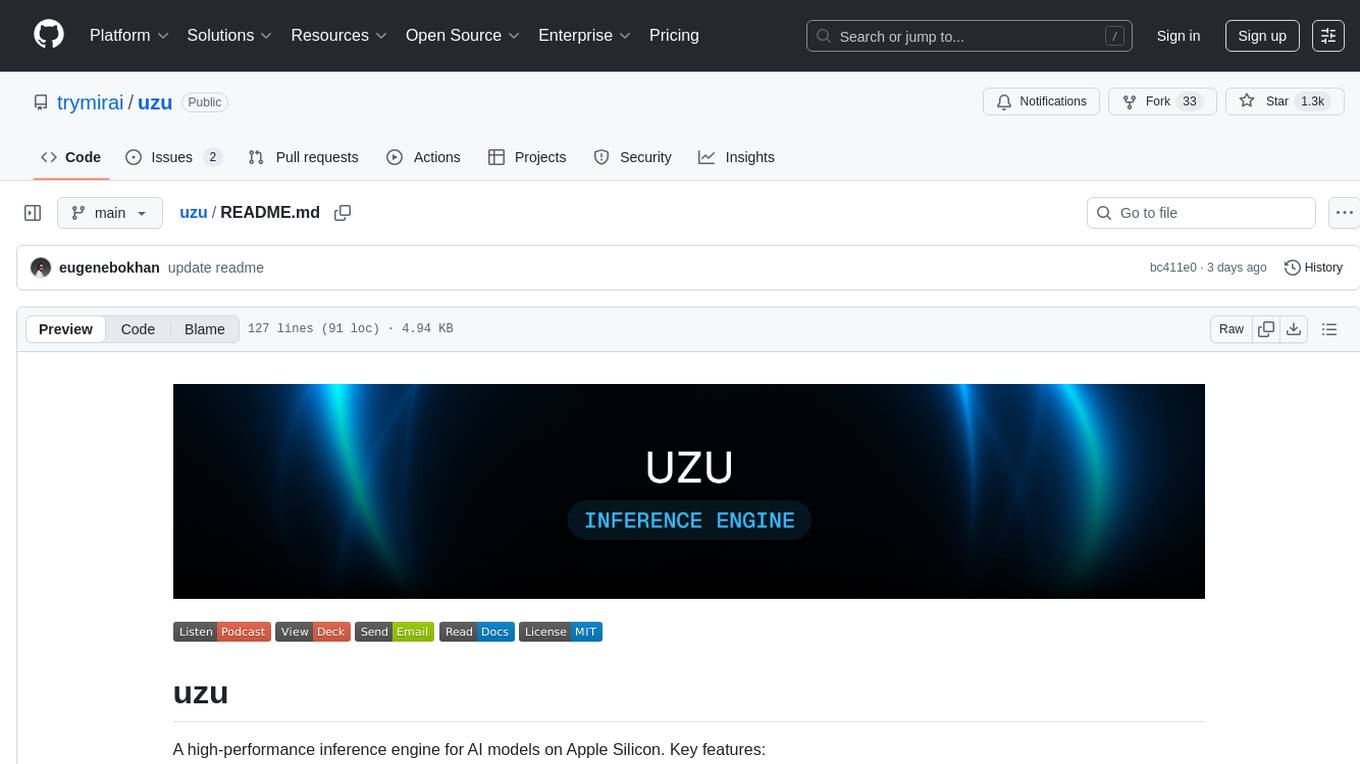
uzu
uzu is a high-performance inference engine for AI models on Apple Silicon. It features a simple, high-level API, hybrid architecture for GPU kernel computation, unified model configurations, traceable computations, and utilizes unified memory on Apple devices. The tool provides a CLI mode for running models, supports its own model format, and offers prebuilt Swift and TypeScript frameworks for bindings. Users can quickly start by adding the uzu dependency to their Cargo.toml and creating an inference Session with a specific model and configuration. Performance benchmarks show metrics for various models on Apple M2, highlighting the tokens/s speed for each model compared to llama.cpp with bf16/f16 precision.
For similar tasks

ai-on-gke
This repository contains assets related to AI/ML workloads on Google Kubernetes Engine (GKE). Run optimized AI/ML workloads with Google Kubernetes Engine (GKE) platform orchestration capabilities. A robust AI/ML platform considers the following layers: Infrastructure orchestration that support GPUs and TPUs for training and serving workloads at scale Flexible integration with distributed computing and data processing frameworks Support for multiple teams on the same infrastructure to maximize utilization of resources

ray
Ray is a unified framework for scaling AI and Python applications. It consists of a core distributed runtime and a set of AI libraries for simplifying ML compute, including Data, Train, Tune, RLlib, and Serve. Ray runs on any machine, cluster, cloud provider, and Kubernetes, and features a growing ecosystem of community integrations. With Ray, you can seamlessly scale the same code from a laptop to a cluster, making it easy to meet the compute-intensive demands of modern ML workloads.

labelbox-python
Labelbox is a data-centric AI platform for enterprises to develop, optimize, and use AI to solve problems and power new products and services. Enterprises use Labelbox to curate data, generate high-quality human feedback data for computer vision and LLMs, evaluate model performance, and automate tasks by combining AI and human-centric workflows. The academic & research community uses Labelbox for cutting-edge AI research.

djl
Deep Java Library (DJL) is an open-source, high-level, engine-agnostic Java framework for deep learning. It is designed to be easy to get started with and simple to use for Java developers. DJL provides a native Java development experience and allows users to integrate machine learning and deep learning models with their Java applications. The framework is deep learning engine agnostic, enabling users to switch engines at any point for optimal performance. DJL's ergonomic API interface guides users with best practices to accomplish deep learning tasks, such as running inference and training neural networks.

mlflow
MLflow is a platform to streamline machine learning development, including tracking experiments, packaging code into reproducible runs, and sharing and deploying models. MLflow offers a set of lightweight APIs that can be used with any existing machine learning application or library (TensorFlow, PyTorch, XGBoost, etc), wherever you currently run ML code (e.g. in notebooks, standalone applications or the cloud). MLflow's current components are:
* `MLflow Tracking

tt-metal
TT-NN is a python & C++ Neural Network OP library. It provides a low-level programming model, TT-Metalium, enabling kernel development for Tenstorrent hardware.

burn
Burn is a new comprehensive dynamic Deep Learning Framework built using Rust with extreme flexibility, compute efficiency and portability as its primary goals.

awsome-distributed-training
This repository contains reference architectures and test cases for distributed model training with Amazon SageMaker Hyperpod, AWS ParallelCluster, AWS Batch, and Amazon EKS. The test cases cover different types and sizes of models as well as different frameworks and parallel optimizations (Pytorch DDP/FSDP, MegatronLM, NemoMegatron...).
For similar jobs

weave
Weave is a toolkit for developing Generative AI applications, built by Weights & Biases. With Weave, you can log and debug language model inputs, outputs, and traces; build rigorous, apples-to-apples evaluations for language model use cases; and organize all the information generated across the LLM workflow, from experimentation to evaluations to production. Weave aims to bring rigor, best-practices, and composability to the inherently experimental process of developing Generative AI software, without introducing cognitive overhead.

LLMStack
LLMStack is a no-code platform for building generative AI agents, workflows, and chatbots. It allows users to connect their own data, internal tools, and GPT-powered models without any coding experience. LLMStack can be deployed to the cloud or on-premise and can be accessed via HTTP API or triggered from Slack or Discord.

VisionCraft
The VisionCraft API is a free API for using over 100 different AI models. From images to sound.

kaito
Kaito is an operator that automates the AI/ML inference model deployment in a Kubernetes cluster. It manages large model files using container images, avoids tuning deployment parameters to fit GPU hardware by providing preset configurations, auto-provisions GPU nodes based on model requirements, and hosts large model images in the public Microsoft Container Registry (MCR) if the license allows. Using Kaito, the workflow of onboarding large AI inference models in Kubernetes is largely simplified.

PyRIT
PyRIT is an open access automation framework designed to empower security professionals and ML engineers to red team foundation models and their applications. It automates AI Red Teaming tasks to allow operators to focus on more complicated and time-consuming tasks and can also identify security harms such as misuse (e.g., malware generation, jailbreaking), and privacy harms (e.g., identity theft). The goal is to allow researchers to have a baseline of how well their model and entire inference pipeline is doing against different harm categories and to be able to compare that baseline to future iterations of their model. This allows them to have empirical data on how well their model is doing today, and detect any degradation of performance based on future improvements.

tabby
Tabby is a self-hosted AI coding assistant, offering an open-source and on-premises alternative to GitHub Copilot. It boasts several key features: * Self-contained, with no need for a DBMS or cloud service. * OpenAPI interface, easy to integrate with existing infrastructure (e.g Cloud IDE). * Supports consumer-grade GPUs.

spear
SPEAR (Simulator for Photorealistic Embodied AI Research) is a powerful tool for training embodied agents. It features 300 unique virtual indoor environments with 2,566 unique rooms and 17,234 unique objects that can be manipulated individually. Each environment is designed by a professional artist and features detailed geometry, photorealistic materials, and a unique floor plan and object layout. SPEAR is implemented as Unreal Engine assets and provides an OpenAI Gym interface for interacting with the environments via Python.

Magick
Magick is a groundbreaking visual AIDE (Artificial Intelligence Development Environment) for no-code data pipelines and multimodal agents. Magick can connect to other services and comes with nodes and templates well-suited for intelligent agents, chatbots, complex reasoning systems and realistic characters.
